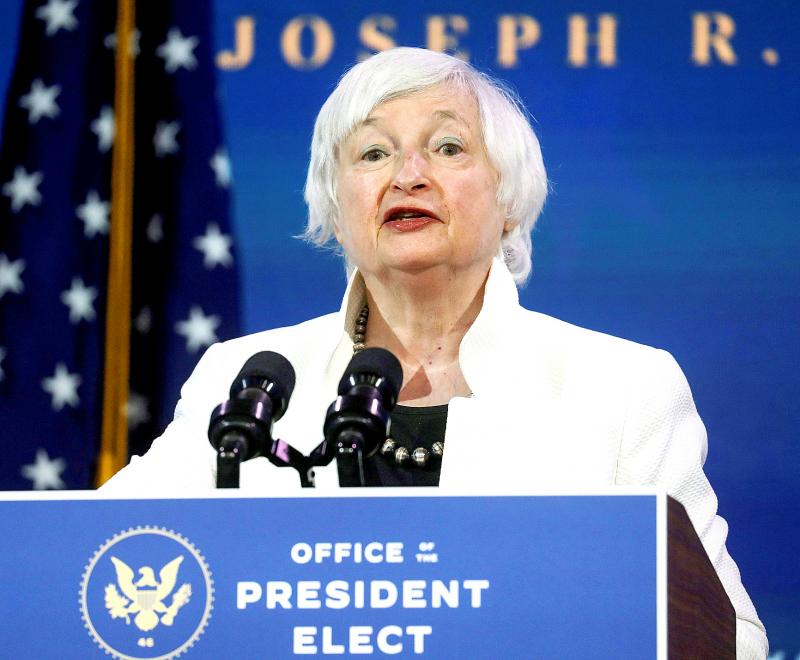Janet Yellen won confirmation to become US secretary of the treasury, building out US President Joe Biden’s team as the administration struggles to win bipartisan support for a US$1.9 trillion COVID-19 relief plan for shoring up a weakening economic recovery.
The first woman to serve in the post, Yellen takes charge of a department with responsibilities spanning tax policy and government spending to financial stability, economic sanctions and foreign-exchange policy.
She also oversees ties with the US Federal Reserve, which she previously chaired. She was confirmed by the US Senate 84-15 on Monday evening.

Photo: Reuters
Yellen already saw the uphill fight the administration faces in its stimulus campaign last week, with Republicans on the Senate Finance Committee rejecting her arguments that historically low interest rates offer an opportunity for expansive deficit spending.
White House economic adviser Brian Deese similarly ran into challenges from a bipartisan group of lawmakers on Sunday, who asked for the basis for such a large package so soon after last month’s US$900 billion bill.
Yellen is relatively new to a political sales role, after having mainly defended and explained Fed actions during her previous career.
However, she brings a wealth of economic knowledge to the administration’s case.
The 74-year-old was also the first woman to head the US central bank, which she left in early 2018 after overseeing a winding back of monetary stimulus after the last recession and its slow recovery.
“The symbolism and sense of technical expertise and decades of Washington experience that Janet Yellen brings will bring immediate credibility” to Biden’s economic agenda, said Tim Adams, who served as a US Department of the Treasury undersecretary during the administration of former US president George W. Bush and now heads the Institute of International Finance, a banking group. “Yellen will be a key anchor of the economic team.”
Yellen has been a trailblazer throughout her career: She was the only woman out of 24 students in 1971 to earn a doctorate in economics from Yale University.
She later taught economics at Harvard University, and worked for more than 16 years at the Fed, including a stint as president of the Federal Reserve Bank of San Francisco during the global financial crisis.
Brooklyn, New York-born Yellen follows former US president Jimmy Carter appointee William Miller, who also served as treasury secretary after being Fed chair.
She will be the first to have had both those jobs and head of the White House Council of Economic Advisers, a role she had during the administration of former US president Bill Clinton.
She had an early look at the challenges of the new job in her confirmation hearing at the Senate panel last week.
Her argument that it is critical to “act big” now with emergency deficit spending to avoid long-term “scarring” in the economy was rejected by Republican lawmakers voicing concerns about rising debt.
“Right now, short-term, I feel that we can afford what it takes to get the economy back on its feet, to get us through the pandemic,” Yellen told the committee.
She highlighted the opportunity presented by historically low interest rates, and flagged that debt-servicing payments as a share of the economy are lower today than before the 2008 financial crisis.

NOT JUSTIFIED: The bank’s governor said there would only be a rate cut if inflation falls below 1.5% and economic conditions deteriorate, which have not been detected The central bank yesterday kept its key interest rates unchanged for a fifth consecutive quarter, aligning with market expectations, while slightly lowering its inflation outlook amid signs of cooling price pressures. The move came after the US Federal Reserve held rates steady overnight, despite pressure from US President Donald Trump to cut borrowing costs. Central bank board members unanimously voted to maintain the discount rate at 2 percent, the secured loan rate at 2.375 percent and the overnight lending rate at 4.25 percent. “We consider the policy decision appropriate, although it suggests tightening leaning after factoring in slackening inflation and stable GDP growth,”

DIVIDED VIEWS: Although the Fed agreed on holding rates steady, some officials see no rate cuts for this year, while 10 policymakers foresee two or more cuts There are a lot of unknowns about the outlook for the economy and interest rates, but US Federal Reserve Chair Jerome Powell signaled at least one thing seems certain: Higher prices are coming. Fed policymakers voted unanimously to hold interest rates steady at a range of 4.25 percent to 4.50 percent for a fourth straight meeting on Wednesday, as they await clarity on whether tariffs would leave a one-time or more lasting mark on inflation. Powell said it is still unclear how much of the bill would fall on the shoulders of consumers, but he expects to learn more about tariffs

Greek tourism student Katerina quit within a month of starting work at a five-star hotel in Halkidiki, one of the country’s top destinations, because she said conditions were so dire. Beyond the bad pay, the 22-year-old said that her working and living conditions were “miserable and unacceptable.” Millions holiday in Greece every year, but its vital tourism industry is finding it harder and harder to recruit Greeks to look after them. “I was asked to work in any department of the hotel where there was a need, from service to cleaning,” said Katerina, a tourism and marketing student, who would

i Gasoline and diesel prices at fuel stations are this week to rise NT$0.1 per liter, as tensions in the Middle East pushed crude oil prices higher last week, CPC Corp, Taiwan (台灣中油) and Formosa Petrochemical Corp (台塑石化) said yesterday. International crude oil prices last week rose for the third consecutive week due to an escalating conflict between Israel and Iran, as the market is concerned that the situation in the Middle East might affect crude oil supply, CPC and Formosa said in separate statements. Front-month Brent crude oil futures — the international oil benchmark — rose 3.75 percent to settle at US$77.01